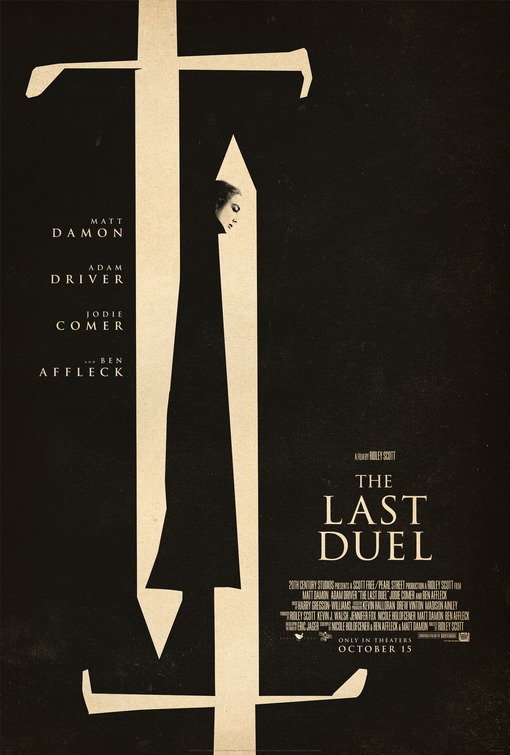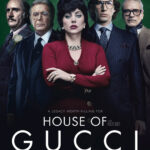The True Story Of A Woman Who Defied A Nation And Made History
Director
Ridley Scott
Starring
Matt Damon
Adam Driver
Jodie Comer
Ben Affleck
1386, Paris. Two knights and former friends, Jean de Carrouges [Damon] and Jacque Le Gris [Driver] square off in an officially recognised judicial duel to the death. Carrouges has accused Le Gris of raping his wife and seeks justice, Le Gris wishes to defend his name and honour. The film then replays the actions leading up to the moment of the duel from the perspectives of Carrouges, Le Gris and Lady Marguerite de Carrouges [Comer], each with their own distinct focus and take on the events.
Firstly it has to be said that this is a Scott film through and through. This will initially scare off some and entice others. Scott is one of the few directors with the clout and passion for this kind of story and the ability to bring it to the screen with all the scope that is required. As such the attention to detail is astounding and the portrayal of knighthood covers the honour, posturing, politics and cold hard cash required of a knight, not to mention the warring and the muddy visceral violence free of the romantic notion of chivalry. This is heightened from start to end with rich production design and absolutely gorgeous visuals from cinematographer Dariusz Wolski. When we finally come to it, the eponymous duel itself is magnificently vicious and scrappy, devoid of all grace or romantic depictions of the past. But the surface sheen of this movie is fascinatingly misleading and the heart of the story is significantly more interesting than originally signposted.
As stated before, the film is segmented into three parts, moreover these components are marked by titlecarded chapters, all of which state “The truth according to..” and then the name of the POV character. For an introduction to the movie, the opening chapter rushes through highlights of the friendship between Carrouges and Le Gris, marked mostly by the growth of hair and beards. Carrouges is introduced to his future wife and nobly weds her to save her father from shame (having previously sided against the King of France). Carrouges is noble, loyal and a hard fighter but for all the pageantry and production spectacle, the first half an hour feels a little toothless and languid. This is partly because the way in which the film intends to unspool, sort of like legal proceedings, isn’t clear yet. It’s only when the second chapter kicks in that the film starts to truly shine.
We then see the same events from Le Gris’ perspective and all of Carrouges’ complaints seem petty, his wife’s glances toward Le Gris more intimate. From Le Gris’ perspective he tries to continually extend his hand in friendship but cannot shake the spurn Carrouges feels for having land intended as a dowry taken from him. Le Gris then approaches Marguerite to confess his love and their sexual encounter is played off as a tryst, with him later confessing to his friend and Lord, Count Pierre d’Alençon [Affleck] that they had an affair but it wasn’t rape, adding, “the customary protest, it was not against her will.” Suddenly the film takes a poignant turn and what had started as a retelling of a famous French tale of either two knights gallantly fighting for honour or two men bickering over name and property eventually becomes a question of a woman’s part in history as an interesting parallel to the Me Too movement. With a 21st century view, we are asked to reassess the evidence and ask, why would a woman make-up such a claim, knowing that to do so would make her a pariah? That to continue down this path could also seen her burn at the stake should her husband fail?
From the outset the film has seemingly little interest in giving the audience what they may expect or want but to tell a complex narrative full of intrigue at its own pace and without stellar performances, this could have easily devolved into an over-baked slog. Thankfully that isn’t the case. Damon and Driver give wonderful dual performances, displaying how the characters perceive themselves. On the one hand Damon believes he is a noble and loving husband who fights bravely for his country. On an expedition to Scotland, during an ambush, his men flee while he stands boldly, arrows ricocheting off his armour crying out, “Why do they run!?” before charging head-first into battle. Then you have Driver being thoroughly charming, romancing women of court and climbing the social ladder due to his connection with the count but also his ability to successfully balance accounts. And yet neither is true. When we finally see both men through Comer’s eyes, Damon is harsh and only concerned with his legacy while Driver is in love with himself, believing he can do whatever he wants without repercussion. We also have Affleck as the thoroughly spoilt Count Pierre and Affleck is clearly having more fun in this role than he has in years. But as with many other Scott pieces, the real highlight, which is only clear from the denouement, is the female lead – but I’ll expand on that later.
**spoilers within as the conclusion is discussed**
Any time someone pens a script that shows the same story from several perspectives, it’s impossible not to reference Rashomon. I’m a little hesitant to do that as part of the beauty of Rashomon is the ambiguity, the sense that we may never know which of the three (technically four) testimonies reflect the truth. The difference here, however, is this tale focuses more on perspective and what is withheld as much as what did or didn’t take place. Rather than wildly different accounts, it’s the nuance and delivery that shifts the tone. The glaring difference is that the third title card states “Chapter Three – The truth according to Lady Marguerite de Carrouges” and as the text fades away the words “the truth” remain. Some could argue this robs the film of ambiguity and cements a definite series of events (and it does) but when you see what the film is trying to say it becomes clear why that is vitally important. At the end of the day, this is a classic legend told through a contemporary lens. It’s not enough to simply present all the evidence and say “make up your own mind.” The script instead actively says, “this woman was raped and risked everything to have justice visited upon her attacker. Believe her.” In that way it is a credit to the fine collaboration between Nicole Holofcener, Damon and Affleck, all of whom are credited as writers.
The Last Duel is a story of complexity, human failings and one that lingers. It’s not the lance strike of something like Gladiator or the decapitating axe blow of Alien, it’s the dagger under the ribs that slowly bleeds out and finds its mark over time. Some will brand it pretentious or unwieldy but it deserves to stand as one of Scott’s best.
Release Date:
15 October 2021
The Scene To Look Out For:
During Marguerite’s chapter, we see not only the real Jean de Carrouges but his wildly contradictory attitude to his property. Illustrating to his wife a bold mare, Carrouges is interrupted when a stallion bolts and mounts her. Furious, Carrouges chastises his servants and mercilessly beats the horse with a shovel, claiming this a matter of money and the mare will breed only noble warhorses from specific stock. It is revealed two scenes later that Carrouges has a fairly warped understanding of how his estate is run and locks pregnant mares away when they should be grazing for their health, refuses to have the horses plough the fields (despite it being faster) because he believes them best used for war and has failed to collect rent from the citizens of his land. All of which serves to highlight to Marguerite that Jean is in fact terrible with property despite his pride leading him to believe otherwise.
Notable Characters:
I mentioned before that Comer’s performance stands above the others. Not only does she have the dual performance of her male counterparts but the additional juxtaposition between a devote wife, a doe-eyed temptress and a woman at the mercy of a world stacked against her. Marguerite’s trial in Paris is mortifying and the indignity with which she is treated by those around her gives Comer a chance to really impress in essentially three roles. A particularly memorable aspect is once the claim is submitted to the crown, Marguerite’s friends abandon her and even her mother in law states it is just the way if things, despite revealing that she too had suffered the same fate. Yet all Marguerite wants is justice and what is right while her husband is solely occupied with being personally wronged.
Highlighted Quote:
“There is no right, there is only the power of men”
In A Few Words:
“A mature slowburn piece that excels as a seldom seen thought-provoking epic period drama”
Total Score: 5/5

![The Red Right Hand Movie Reviews [Matthew Stogdon]](https://reviews.theredrighthand.co.uk/wp-content/uploads/2021/12/cropped-header1.png)



